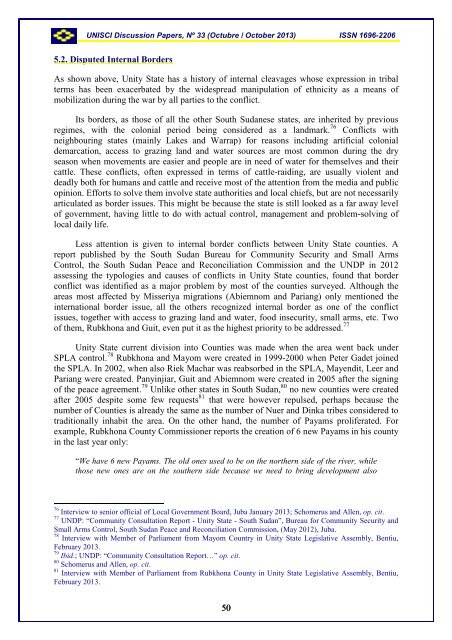UNISCI - Universidad Complutense de Madrid
UNISCI - Universidad Complutense de Madrid
UNISCI - Universidad Complutense de Madrid
Create successful ePaper yourself
Turn your PDF publications into a flip-book with our unique Google optimized e-Paper software.
<strong>UNISCI</strong> Discussion Papers, Nº 33 (Octubre / October 2013) ISSN 1696-22065.2. Disputed Internal Bor<strong>de</strong>rsAs shown above, Unity State has a history of internal cleavages whose expression in tribalterms has been exacerbated by the wi<strong>de</strong>spread manipulation of ethnicity as a means ofmobilization during the war by all parties to the conflict.Its bor<strong>de</strong>rs, as those of all the other South Sudanese states, are inherited by previousregimes, with the colonial period being consi<strong>de</strong>red as a landmark. 76 Conflicts withneighbouring states (mainly Lakes and Warrap) for reasons including artificial colonial<strong>de</strong>marcation, access to grazing land and water sources are most common during the dryseason when movements are easier and people are in need of water for themselves and theircattle. These conflicts, often expressed in terms of cattle-raiding, are usually violent and<strong>de</strong>adly both for humans and cattle and receive most of the attention from the media and publicopinion. Efforts to solve them involve state authorities and local chiefs, but are not necessarilyarticulated as bor<strong>de</strong>r issues. This might be because the state is still looked as a far away levelof government, having little to do with actual control, management and problem-solving oflocal daily life.Less attention is given to internal bor<strong>de</strong>r conflicts between Unity State counties. Areport published by the South Sudan Bureau for Community Security and Small ArmsControl, the South Sudan Peace and Reconciliation Commission and the UNDP in 2012assessing the typologies and causes of conflicts in Unity State counties, found that bor<strong>de</strong>rconflict was i<strong>de</strong>ntified as a major problem by most of the counties surveyed. Although theareas most affected by Misseriya migrations (Abiemnom and Pariang) only mentioned theinternational bor<strong>de</strong>r issue, all the others recognized internal bor<strong>de</strong>r as one of the conflictissues, together with access to grazing land and water, food insecurity, small arms, etc. Twoof them, Rubkhona and Guit, even put it as the highest priority to be addressed. 77Unity State current division into Counties was ma<strong>de</strong> when the area went back un<strong>de</strong>rSPLA control. 78 Rubkhona and Mayom were created in 1999-2000 when Peter Ga<strong>de</strong>t joinedthe SPLA. In 2002, when also Riek Machar was reabsorbed in the SPLA, Mayendit, Leer andPariang were created. Panyinjiar, Guit and Abiemnom were created in 2005 after the signingof the peace agreement. 79 Unlike other states in South Sudan, 80 no new counties were createdafter 2005 <strong>de</strong>spite some few requests 81 that were however repulsed, perhaps because thenumber of Counties is already the same as the number of Nuer and Dinka tribes consi<strong>de</strong>red totraditionally inhabit the area. On the other hand, the number of Payams proliferated. Forexample, Rubkhona County Commissioner reports the creation of 6 new Payams in his countyin the last year only:“We have 6 new Payams. The old ones used to be on the northern si<strong>de</strong> of the river, whilethose new ones are on the southern si<strong>de</strong> because we need to bring <strong>de</strong>velopment also76 Interview to senior official of Local Government Board, Juba January 2013; Schomerus and Allen, op. cit.77 UNDP: “Community Consultation Report - Unity State - South Sudan”, Bureau for Community Security andSmall Arms Control, South Sudan Peace and Reconciliation Commission, (May 2012), Juba.78 Interview with Member of Parliament from Mayom Country in Unity State Legislative Assembly, Bentiu,February 2013.79 Ibid.; UNDP: “Community Consultation Report…” op. cit.80 Schomerus and Allen, op. cit.81 Interview with Member of Parliament from Rubkhona County in Unity State Legislative Assembly, Bentiu,February 2013.50
















